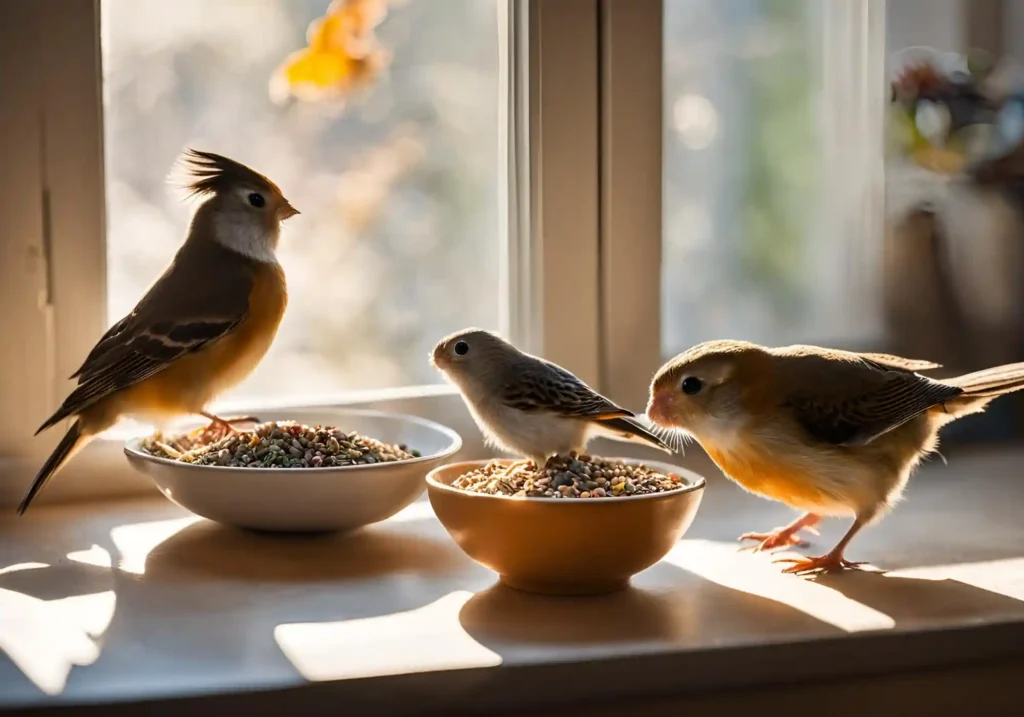Hamster food is packed with seeds, grains, and other small bites that might seem like a perfect snack for birds, but is it really safe for them? While some ingredients in hamster food are similar to what birds eat, their nutritional needs are different.
If you’ve ever thought about sharing hamster food with your feathered friends, it’s important to know whether it’s a good idea.
Let’s explore whether birds can safely eat hamster food and what you should consider before offering it to them.
Do Birds Eat Hamster Food?
Birds can eat hamster food, but it is not the best choice for their diet. Hamster food is formulated for the nutritional needs of hamsters, which differ significantly from those of birds.
While the seeds and pellets in hamster food might not be harmful, they lack essential nutrients that birds require for a balanced diet.
Birds thrive on a diet rich in seeds, fruits, and vegetables, so hamster food should be considered more of an occasional snack rather than a staple food.
Can Parrots Eat Hamster Food?
Parrots can eat hamster food in small amounts, but it should not be their primary source of nutrition. Hamster food often contains ingredients that are not ideal for parrots, such as high-fat seeds and additives.
Parrots need a varied diet that includes pellets specifically designed for their species, along with fresh fruits and vegetables.
If your parrot consumes a small amount of hamster food, it is unlikely to cause immediate harm, but it should not replace their regular diet.
Can Wild Birds Eat Hamster Food?
Wild birds may nibble on hamster food if they come across it, but it is not a natural part of their diet. While some of the seeds and grains in hamster food may be acceptable for certain bird species, it is important to note that wild birds are better suited to eating seeds, nuts, and berries found in their natural environment.
If you are looking to feed wild birds, it’s best to provide them with food specifically designed for birds.
Is Hamster Food Safe for Birds?
In small amounts, hamster food is generally safe for birds, but it should not be a major component of their diet. The potential risk arises from the lack of proper nutritional balance in hamster food for avian needs.
Ingredients such as high-fat seeds or added preservatives could pose a risk if consumed frequently.
It’s always better to stick to bird-specific foods that provide all the nutrients birds require for optimal health.
What Ingredients in Hamster Food Are Harmful to Birds?
Some ingredients commonly found in hamster food may not be suitable for birds. For example, hamster food can contain high-fat seeds, artificial flavors, and preservatives that may lead to health issues for birds if consumed regularly.
Additionally, the overall balance of nutrients in hamster food does not meet the dietary needs of birds, which could result in deficiencies or health problems over time.
Are Seeds in Hamster Food Suitable for Birds?

Many of the seeds found in hamster food can be suitable for birds, particularly those that are similar to what birds naturally eat, like sunflower seeds and millet.
However, it is important to ensure that the seeds do not come from a mix that includes harmful additives or high-fat content.
While birds might enjoy these seeds, it’s best to offer them seeds that are specifically meant for avian consumption to ensure their health and well-being.
Do Birds Like Eating Hamster Food?
Birds may show interest in hamster food, especially if they enjoy the seeds or grains present in the mix. However, their preference can vary widely among species. Some birds might enjoy the texture or flavor, while others may not be as enthusiastic.
While birds can snack on hamster food occasionally, it is essential to provide them with a diet that meets their nutritional needs and preferences for the best results.
What Types of Birds Can Eat Hamster Food?
Smaller birds such as finches, canaries, and budgies might be more inclined to eat hamster food due to the small size of the seeds and pellets. However, this does not mean that it is an appropriate long-term diet for them.
Parrots might also try hamster food if they are curious, but they should primarily be fed a diet specifically formulated for their needs.
Always monitor how different bird species respond to hamster food and provide them with alternatives that better suit their nutritional requirements.
Are There Nutritional Benefits for Birds Eating Hamster Food?
While hamster food can contain seeds that provide some energy, it lacks the necessary vitamins, minerals, and overall balance that birds require.
There might be some incidental benefits from the seeds in hamster food, but overall, it does not compare to a diet specifically designed for birds.
To ensure your birds get the nutrition they need, it’s essential to provide them with bird-specific foods that offer a complete range of nutrients.
Can Feeding Hamster Food to Birds Cause Health Issues?
Feeding hamster food to birds on a regular basis can potentially lead to health issues, primarily due to the imbalanced nutrition it provides.
Birds might suffer from deficiencies or excesses of certain nutrients, leading to problems such as obesity, poor feather quality, and even digestive issues.
Therefore, while a small amount of hamster food may not cause immediate harm, it should never replace a well-rounded diet suitable for birds.
How Often Can Birds Safely Eat Hamster Food?
Birds should only eat hamster food occasionally and in small amounts. It should not become a regular part of their diet due to the lack of essential nutrients.
Treating hamster food as an occasional snack ensures that birds receive their necessary nutrition from foods specifically formulated for them. Moderation is key to maintaining their health and well-being.
Should Hamster Food Be Given to Birds as a Regular Part of Their Diet?
Hamster food should not be given to birds as a regular part of their diet. While it might be safe in small amounts, it does not provide the balanced nutrition birds need for optimal health.
A bird’s diet should primarily consist of seeds, pellets, fresh fruits, and vegetables. Relying on hamster food could lead to nutritional deficiencies or health problems over time.
Can My Pet Birds Eat Hamster Food?

Pet birds can eat hamster food, but it should only be an occasional treat rather than a staple food. If your pet bird happens to nibble on hamster food, it is unlikely to cause harm, but it should not replace their balanced diet.
Always ensure that your pet birds have access to foods that meet their specific nutritional needs to keep them healthy.
Are There Any Risks Associated with Feeding Hamster Food to Birds?
Yes, there are risks associated with feeding hamster food to birds, particularly if it becomes a regular part of their diet. The nutritional imbalances present in hamster food can lead to various health issues, including obesity, digestive problems, and deficiencies in essential nutrients.
It’s important to be aware of these risks and to prioritize a diet that is specifically designed for birds.
What Should I Do If My Bird Eats Hamster Food?
If your bird eats hamster food, don’t panic. A small amount is not likely to cause immediate harm. However, keep an eye on your bird to ensure it does not develop any adverse reactions, such as digestive upset.
In the future, focus on providing bird-safe foods that meet their nutritional needs and limit access to hamster food.
Birds That Might Eat Hamster Food?
Several types of birds might be curious about hamster food and nibble on it, including small finches, canaries, and budgies. Parrots may also show interest, but the primary diet for these birds should remain bird-specific.
While they may consume hamster food, it should not be a primary food source. Always prioritize offering suitable bird foods to ensure their health.
Can Ducks Eat Hamster Food?
Ducks can technically eat hamster food, but it is not ideal for their diet. Ducks require a diet that includes grains, seeds, and green leafy vegetables, which better meets their nutritional needs.
If ducks do consume hamster food occasionally, it should not replace their regular diet. Always provide ducks with a balanced diet to promote their overall health and well-being.






